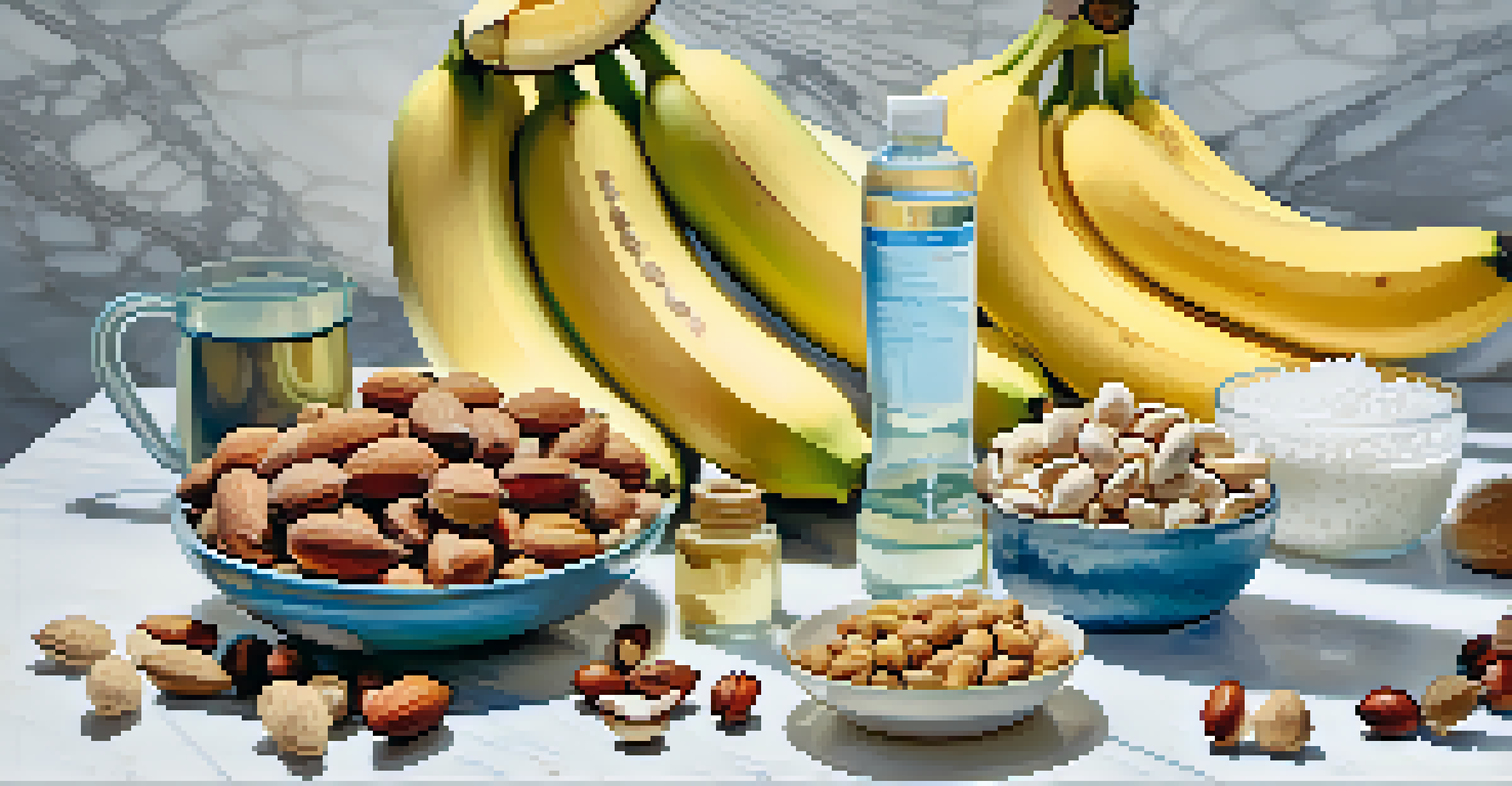The Role of Hydration in Achieving Fitness Goals

Why Hydration is Essential for Overall Health
Hydration plays a crucial role in maintaining our body's balance. Water constitutes about 60% of our body weight, making it essential for nearly every bodily function. From regulating temperature to transporting nutrients, staying adequately hydrated is key to overall health.
Water is the driving force of all nature.
When we don't drink enough water, we can experience fatigue, headaches, and decreased performance. Think of hydration like oil in a car engine—it keeps everything running smoothly. Without it, you might find yourself sputtering rather than cruising along towards your fitness goals.
Moreover, proper hydration supports digestion and helps flush out toxins. By ensuring your body has enough fluid, you’re not just quenching your thirst; you're setting the stage for better health and improved workout performance.
How Hydration Affects Workout Performance
The link between hydration and workout performance is significant. Even a small decrease in fluid levels can lead to increased fatigue and reduced endurance. For instance, losing just 2% of your body weight in water can impair your performance, making it harder to push through that last set of squats.

Hydrated muscles work more effectively, allowing you to perform exercises with better form and intensity. Imagine trying to sprint in a heavy, damp shirt—it's uncomfortable and exhausting! Staying hydrated helps you feel light and energized, letting you focus on your workout, not your thirst.
Hydration Fuels Body Functions
Staying hydrated is essential for regulating temperature, transporting nutrients, and maintaining overall health.
Additionally, hydration aids in recovery post-workout. Drinking water helps transport nutrients to muscles, reducing soreness and speeding up recovery times. This means you can hit the gym again sooner and stronger, inching closer to your fitness goals.
Signs of Dehydration to Watch For
Recognizing the signs of dehydration is essential for anyone pursuing fitness goals. Common indicators include dry mouth, fatigue, and dark yellow urine. If you’ve ever felt sluggish during a workout or noticed your skin losing its elasticity, you might be experiencing mild dehydration.
Drinking water is like washing out your insides.
Another sign to look out for is increased thirst. While it’s a natural cue to drink more water, waiting until you feel thirsty can mean you’re already dehydrated. It's a bit like waiting until your car is on 'E' to fill up the tank—it's better to be proactive and keep your fluid levels topped off.
Pay attention to your body, especially during intense workouts or hot weather. Keeping a water bottle nearby can serve as a reminder to drink consistently, helping you stay on top of your hydration game and ultimately enhancing your performance.
Best Practices for Staying Hydrated
Staying hydrated isn't just about drinking water; it's about doing it strategically. A good rule of thumb is to drink at least half your body weight in ounces of water each day. For example, if you weigh 150 pounds, aim for 75 ounces of water. Simple, right?
In addition to water, incorporating foods with high water content, like fruits and vegetables, can boost your hydration levels. Think about snacking on watermelon or cucumber during your day; not only are they refreshing, but they're also hydrating!
Hydration Boosts Workout Performance
Proper hydration improves endurance and recovery, allowing for better workout performance and quicker recovery times.
It's also wise to sip water before, during, and after workouts. This approach helps maintain your hydration levels and can lead to better performance. Keeping a water bottle handy can turn hydration into a habit rather than an afterthought.
Hydration Needs for Different Activities
Your hydration needs can vary based on the type of activity you’re doing. For instance, if you're engaging in high-intensity workouts or endurance training, your fluid requirements will be higher than during a leisurely walk. Tailoring your hydration strategy to your activity level can help optimize performance.
In hotter climates or during summer months, you may need to increase your fluid intake even more. Think of it like a car needing more fuel during a long road trip; you can't afford to run low while trying to reach your destination.
Listening to your body is key. If you're sweating heavily or feeling thirsty, it's a clear signal to drink more. Understanding your personal hydration needs can make a world of difference in achieving your fitness goals.
The Role of Electrolytes in Hydration
While water is vital, electrolytes play a crucial role in hydration too. These minerals, such as sodium, potassium, and magnesium, help regulate fluid balance in the body. When you sweat during exercise, you lose electrolytes, which can lead to cramping and fatigue if not replenished.
Think of electrolytes as the spark plugs of your hydration system. Just as a car needs spark plugs to ignite fuel, your body needs electrolytes to make the most out of the water you consume. They work together to ensure your body functions optimally, especially during intense workouts.
Signs of Dehydration to Watch For
Recognizing symptoms like dry mouth and fatigue can help you stay proactive about your hydration needs.
Incorporating electrolyte-rich foods or beverages can help restore balance and maintain performance. Whether it's coconut water, sports drinks, or a pinch of salt in your water, finding ways to replenish those lost minerals can keep you feeling your best.
Long-Term Benefits of Staying Hydrated
The benefits of staying hydrated extend far beyond immediate workout performance. Over time, maintaining proper hydration can lead to improved skin health, better digestion, and enhanced cognitive function. It’s like watering a plant; consistent care leads to vibrant growth.
Hydration can also support weight management. Sometimes our bodies confuse thirst for hunger, leading us to snack when all we really need is a glass of water. By staying hydrated, you can avoid unnecessary calorie intake and keep your diet on track.

Ultimately, the long-term benefits of hydration contribute to a more energetic and healthy lifestyle. As you continue to prioritize your hydration, you'll likely notice not just improvements in your workouts, but in overall well-being as well.